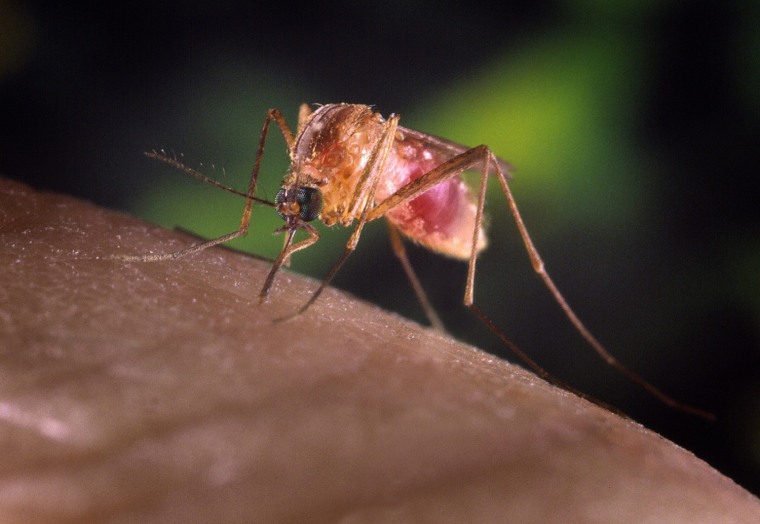After decades of frustrating research to find a highly effective malaria vaccine, a novel approach is showing promise against the mosquito-transmitted disease, a team of government, academic, and private researchers reported in a study published Thursday in the journal Science. Malaria infected an estimated 200 million people worldwide in 2010 and caused as many as 1.24 million deaths, mostly in children.
In an early-stage clinical trial, the so-named PfSPZ vaccine protected from malaria infection all six volunteers who received five doses, the most, and protected six of the nine volunteers who received four doses. In contrast, five out of the six unvaccinated participants became infected with the disease.
"Clearly the results that these authors obtained are really very impressive. For those individuals receiving five doses, they are recording 100 percent protection,” says Nirbhay Kumar, chair of the Department of Tropical Medicine at Tulane University School of Public Health and Tropical Medicine in New Orleans, who is working on a different kind of vaccine that would prevent mosquitoes from transmitting the Plasmodium parasites that cause malaria. That level of protection is the highest seen so far in any malaria vaccine trial.
But today’s published study involved a Phase I clinical trial, the first step in human testing, and the number of subjects is very small. “Clearly this is just the beginning” of research needed to determine if the vaccine could ever be of practical use, says Kumar.
Dr. Anthony Fauci, an immunologist and director of the National Institute of Allergy and Infectious Diseases (NIAID), where the clinical trial took place, agrees. "There is a lot more work to be done,” he says. Fauci calls the results “an important proof of concept that a very high degree of efficacy can be attained by this product.”
The vaccine product consists of Plasmodium falciparum sporozoites, an immature stage of the parasite, that have been weakened by irradiation. In comparison, the leading malaria vaccine candidate, RTS,S, currently in Phase III human trials, contains a single surface protein from the sporozoite. But RTS,S results “have been disappointing,” says Kumar. Studies have shown that RTS,S protects approximately half of volunteers against malaria infection two to three weeks after the last vaccine dose and 22 percent at five months out.
The PfSPZ vaccine researchers chose to use the whole parasite rather than just a protein because, for 40 years, scientists have known that strong, sustained immunity could be achieved by exposing human volunteers to the bites of irradiated, infected mosquitos. But “it took up to 1,000 mosquito bites to confer high-level protection,” said lead author Dr. Robert Seder, Chief of the Cellular Immunology Section at the Vaccine Research Center within NIAID, in a Science podcast.
Unlike most other vaccines against various diseases, which are injected into the skin, this vaccine is delivered intravenously. Earlier tests of the PfSPZ vaccine using standard injection did not produce high levels of protection against malaria. But intravenous delivery presents a serious challenge.
“You can certainly use an intravenously administered vaccine in special populations such as tourists and perhaps the military,” says Fauci. “But if you want to do a mass vaccination program such as in Southern Africa where Plasmodium falciparum malaria is a very important problem, the logistics of that are somewhat complicated.”
Researchers are planning studies in Africa, Europe and the United States to explore whether higher doses using standard injection might achieve the same results. In addition, other important questions will need to be answered before the PfSPZ vaccine could be put to use in the field.
“The critical question is how long does this immunity last,” says Fauci. Volunteers were exposed to malaria infection through the bites of five infected mosquitoes approximately three weeks after receiving the last dose of vaccine. (Those who came down with the disease were promptly treated with antimalarial drugs.) “We don’t know yet whether this is going to be durable protection,” says Fauci.
Future studies will also address whether the vaccine will work against multiple strains of the parasite that exist in the wild. The infected mosquitoes that bit the volunteers carried the same strain that was used to manufacture the vaccine.
While significant progress against malaria has been made using insecticide-impregnated bed nets, insect control, and indoor insecticide spraying, those efforts often slip in a region once malaria infection rates decline, says Fauci, calling it human nature, and then infection rates rebound.
"Historically, if you really get a vaccine that works, and you can really get it administered widely, that’s the way you control, eliminate and even eradicate certain diseases,” says Fauci.
